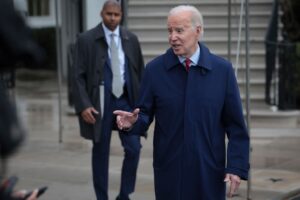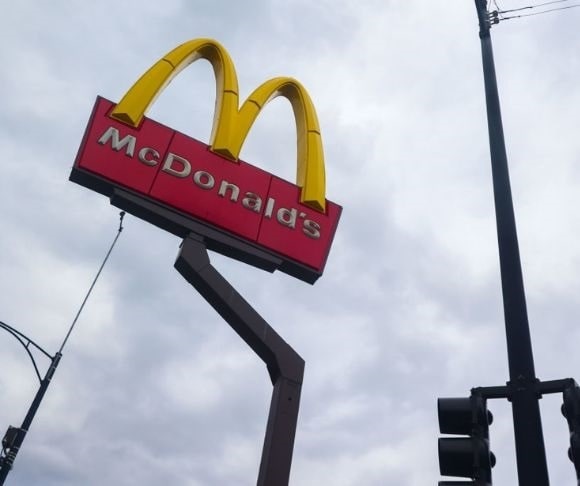As greater numbers of Americans express alarm over the escalating national security threat posed by China, iconic name-brand US-based multinational corporations are reaffirming their eagerness to do business with the Asian communist superpower. As The Wall Street Journal reported Feb. 27:
“Large American companies from fast food to high-end fashion are increasing their bets on China’s consumers in anticipation of a postpandemic rebound for the world’s second-biggest economy.
McDonald’s Corp. and Starbucks Corp. are opening hundreds of new restaurants. Retailers Ralph Lauren Corp. and Tapestry Inc. are launching new stores. And Tyson Foods Inc. and Hormel Foods Corp. are opening new facilities, as they see a long-term appetite for American-style foods.”
Simply put, the urge to tap into China’s enormous customer base is irresistible to multinational corporations that root their prime business strategy in constant expansion. In February, The Journal quoted Tapestry CEO Joanne Crevoiserat as saying, “We’re confident in the long-term opportunities for China as a growth vehicle.” Starbucks top executive Howard Schultz also declared, last month, “I remain more confident than ever that we are still only in the early chapters of our growth story in China.”
‘We Should Be Incredibly Worried’
But how does that “growth” mantra jibe with this?
“We should be incredibly worried,” Rep. Tim Burchett (R-TN), vice chairman of the House Committee on Foreign Affairs, Subcommittee on the Middle East, North Africa, and Central Asia, told Liberty Nation’s Dave Patterson in an exclusive interview. “I’ve talked to many experts in classified and unclassified meetings that tell me the Chinese Communist Party’s attempts to grow its power and infiltrate the United States are widespread and pose a real threat to our national security.”
LN has detailed China’s aggressive moves to purchase farmland in America, property next to US military facilities, and, astonishingly, military officer training academies. The number of Chinese nationals attempting to illegally enter the US has skyrocketed in recent months.
Yet there is no reason to believe any of this will deter American-based companies operating on a trans-national basis from embracing the Chinese market. Even at the cost of increasing the security threat to the US posed by China.
“[T]he iPhone has gone from being a product that is designed in California and made in China to one that is a creation of both countries,” The New York Times reported in September as the new iPhone 14 made its debut.
“The critical work provided by China reflects the country’s advancements over the past decade and a new level of involvement for Chinese engineers in the development of iPhones,” the paper noted. “After the country lured companies to its factories with legions of low-priced workers and unrivaled production capacity, its engineers and suppliers have moved up the supply chain to claim a bigger slice of the money that U.S. companies spend to create high-tech gadgets.”
The alarming takeaway: companies get sucked into China for the cheap production costs and end up ceding their technological prowess to a nation infamous for stealing such knowledge via corporate espionage. US manufacturing suffers as a result.
Biden Administration’s China Corporate Ties
An Aug. 21 “US-China Business Forum” organized by Forbes China revealed that American-based corporations fully understand the regime’s politicization of their commercial efforts but still won’t back away from the lure of 1.45 billion potential customers. Forbes reported:
“‘You have a heavier intrusion of politics’ into the commercial landscape,’ said Kenneth Jarrett, senior advisor to the Albright Stonebridge Group. ‘Companies just want to go about their business, (but) it’s increasingly difficult for them to have a pure business focus.’…
‘They are quite committed to this market, and they see this as critical to their global performance. Companies don’t intend to leave. There actually hasn’t been that much activity in terms of leaving or reshoring.’”
Albright Stonebridge Group, which now operates under the Dentons Global Advisors umbrella, is a global business strategy firm formerly chaired by ex-Bill Clinton Secretary of State Madeleine Albright. Senior advisor Jarrett’s ties to the Red regime appear to be substantial.

Joe Biden (Photo by Win McNamee/Getty Images)
Jarrett is “a resident of Shanghai since 2005 who was president of the American Chamber of Commerce in Shanghai for five years before joining ASG in 2018,” Forbes disclosed. “Previously, Jarrett was U.S. consul general in Shanghai, deputy consul general in Hong Kong and director of Asian affairs at the White House National Security Council.”
“He is the recipient of the Magnolia Award (Silver) from the Shanghai government and is a member of the National Committee [on] U.S.-China Relations,” his Albright Stonebridge bio reads.
The Washington Free Beacon in June 2021 reported on parent company Dentons’ China interests and many connections to the Biden administration. Dentons “operates the largest legal firm in China,” the paper observed. “Included among Albright Stonebridge alumni are several of President Joe Biden’s top advisers on national security matters. Before joining the administration, U.N. ambassador Linda Thomas-Greenfield led the firm’s Africa shop, while Vice President Kamala Harris’s national security adviser Philip Gordon worked as a senior adviser for the organization. Controversial State Department appointees Victoria Nuland and Wendy Sherman also worked for Albright Stonebridge during the Trump administration.”
It’s not just about a new McDonald’s opening in Guangzhou. The knots binding American businesses to China are far more tangled than that.




